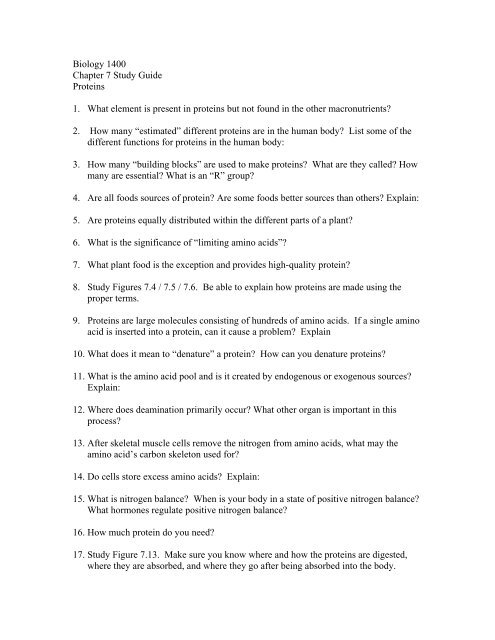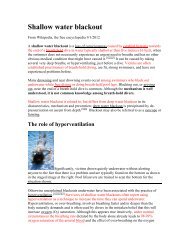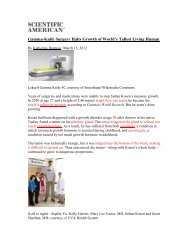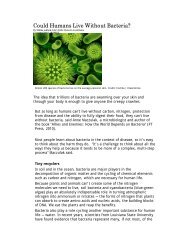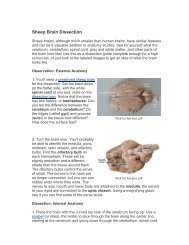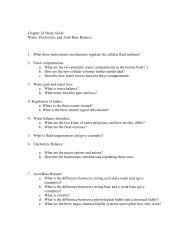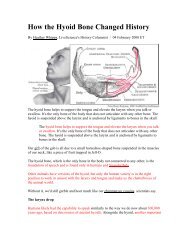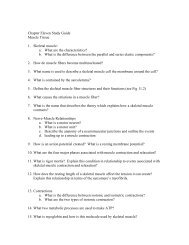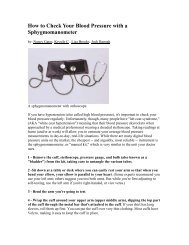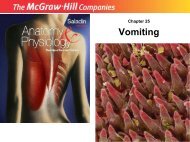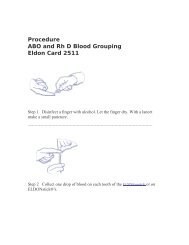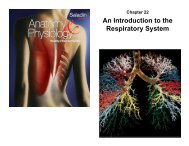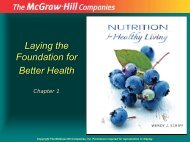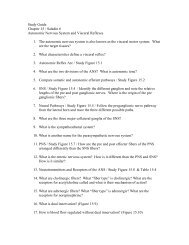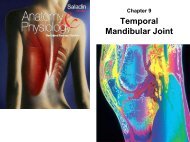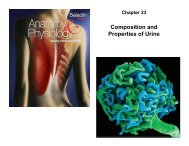Biology 1400 Chapter 7 Study Guide Proteins 1. What element is ...
Biology 1400 Chapter 7 Study Guide Proteins 1. What element is ...
Biology 1400 Chapter 7 Study Guide Proteins 1. What element is ...
- No tags were found...
Create successful ePaper yourself
Turn your PDF publications into a flip-book with our unique Google optimized e-Paper software.
<strong>Biology</strong> <strong>1400</strong><br />
<strong>Chapter</strong> 7 <strong>Study</strong> <strong>Guide</strong><br />
<strong>Proteins</strong><br />
<strong>1.</strong> <strong>What</strong> <strong>element</strong> <strong>is</strong> present in proteins but not found in the other macronutrients?<br />
2. How many “estimated” different proteins are in the human body? L<strong>is</strong>t some of the<br />
different functions for proteins in the human body:<br />
3. How many “building blocks” are used to make proteins? <strong>What</strong> are they called? How<br />
many are essential? <strong>What</strong> <strong>is</strong> an “R” group?<br />
4. Are all foods sources of protein? Are some foods better sources than others? Explain:<br />
5. Are proteins equally d<strong>is</strong>tributed within the different parts of a plant?<br />
6. <strong>What</strong> <strong>is</strong> the significance of “limiting amino acids”?<br />
7. <strong>What</strong> plant food <strong>is</strong> the exception and provides high-quality protein?<br />
8. <strong>Study</strong> Figures 7.4 / 7.5 / 7.6. Be able to explain how proteins are made using the<br />
proper terms.<br />
9. <strong>Proteins</strong> are large molecules cons<strong>is</strong>ting of hundreds of amino acids. If a single amino<br />
acid <strong>is</strong> inserted into a protein, can it cause a problem? Explain<br />
10. <strong>What</strong> does it mean to “denature” a protein? How can you denature proteins?<br />
1<strong>1.</strong> <strong>What</strong> <strong>is</strong> the amino acid pool and <strong>is</strong> it created by endogenous or exogenous sources?<br />
Explain:<br />
12. Where does deamination primarily occur? <strong>What</strong> other organ <strong>is</strong> important in th<strong>is</strong><br />
process?<br />
13. After skeletal muscle cells remove the nitrogen from amino acids, what may the<br />
amino acid’s carbon skeleton used for?<br />
14. Do cells store excess amino acids? Explain:<br />
15. <strong>What</strong> <strong>is</strong> nitrogen balance? When <strong>is</strong> your body in a state of positive nitrogen balance?<br />
<strong>What</strong> hormones regulate positive nitrogen balance?<br />
16. How much protein do you need?<br />
17. <strong>Study</strong> Figure 7.13. Make sure you know where and how the proteins are digested,<br />
where they are absorbed, and where they go after being absorbed into the body.
18. <strong>What</strong> <strong>is</strong> a food allergy? <strong>What</strong> “goes wrong” with the normal digestive process to<br />
initiate a food allergy? Overly sensitive people can have a severe reaction to a food<br />
allergen. <strong>What</strong> <strong>is</strong> th<strong>is</strong> called and how can you “reverse” the symptoms?<br />
19. Allergic responses can also occur from non-protein molecules found in food, like<br />
sulfites. <strong>What</strong> are sulfites?<br />
20. <strong>What</strong> <strong>is</strong> gliadin? <strong>What</strong> affect does th<strong>is</strong> molecule have on products made from dough?<br />
<strong>What</strong> <strong>is</strong> the cause of celiac d<strong>is</strong>ease and what are the symptoms?<br />
2<strong>1.</strong> <strong>What</strong> <strong>is</strong> PKU? Which essential amino acid <strong>is</strong> not be metabolized and then builds up<br />
to toxic levels to damage nerve cells? Why <strong>is</strong> aspartame a danger to people who have<br />
PKU?<br />
22. Animal protein supply about 70% of the protein that we eat. Some of these are the<br />
most expensive items in your grocery cart. How can you get all the protein you<br />
require for far less money? <strong>What</strong> <strong>is</strong> the rule-of-thumb for getting all the amino acids<br />
you need, both essential and non-essential , from plant food?<br />
23. <strong>What</strong> <strong>is</strong> a vegetarian? <strong>What</strong> <strong>is</strong> an omnivore?<br />
24. Is vegetarian<strong>is</strong>m a healthy lifestyle? If you and your family decide to live a<br />
vegetarian lifestyle, what should you be concerned about?<br />
25. Where would you expect to find protein-energy malnutrition (PEM)? <strong>What</strong> are two<br />
forms of PEM are how are they related?


